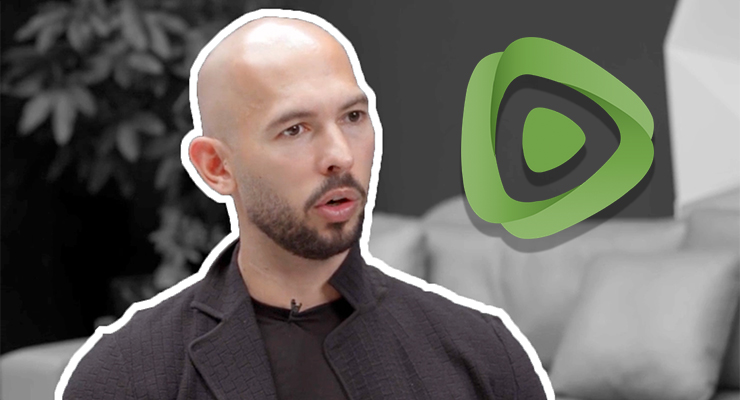
When Andrew Tate was booted from Instagram, YouTube and TikTok earlier this month, the internet celebrity announced that Rumble would be the new digital home for his content. Not long after, the alt-tech video platform went to number one on the Apple and Google app stores.
Tate is the latest online personality whose controversial statements and acts have tested what tech companies will allow on their platforms. Like Alex Jones or Milo Yiannopoulos before him, Tate’s conduct — in this case, hate speech — led to him being deplatformed. Rumble welcomed him with open arms.
Although the company has been around for almost a decade, the YouTube competitor has shot to prominence in recent years in reaction to Google’s and Facebook’s increasing efforts to moderate misinformation and hate.
Rumble, like a number of other alt-tech companies, positions itself as a “free speech alternative”. Of course, there are limits to the company’s commitment to opposing censorship; the platform’s rules ban unlawful conduct, pornography, stalking, discrimination and unauthorised advertising.
Its promise of being “immune to cancel culture” means in practice that it will allow users to post content containing dangerous lies and conspiracy theories. In fact, the platform actually pushes users towards misinformation through its recommendations: “If you search ‘vaccine’ on Rumble, you are three times more likely to be recommended videos containing misinformation about the coronavirus than accurate information,” WIRED journalists Ellie House, Alice Wright and Isabelle Stanley wrote.
This willingness to accept and even promote misinformation has made it popular with online right figures embracing conspiracy and hate. Prominent right-wing figures like Donald Trump, Sean Hannity and Dan Bongino post Rumble videos alongside people like Alex Jones, QAnon believers and anti-vaxxers.
Tate’s public migration to Rumble has given the platform a boost in popularity, but the company is no flash in the pan. It has prominent backers, such as Peter Thiel, and late last year announced intentions to go public on the Nasdaq at a US$2.1 billion dollar valuation.
Alt-tech platforms are a dime a dozen, but Rumble has shown a longevity and sustained popularity that some others haven’t. The growing popularity of a legitimate tech player that promotes harmful information is a new threat to our already polluted information ecosystem.








These are interesting times. Is shutting down misinformation really the right thing to do? I see the logic and understand the rationale of doing so, and there are topics dear to me I want to see it happen (like shutting up climate change deniers). But I also see the siloing of argument…meaning we are less and less likely to see and be forced to consider opinions contrary to our own. This has huge social ramifications.
I’m really torn about the efficacy of shutting down rhetoric. Does it work? Is it right? Is there an alternative?
Shutting down information is the authoritarian counter to people applying selection, critical thinking and weighing up the validity of an argument/spout/rant. Yes, I know there is precious little of that that seems to go on, online, but the choice should be there.
There is certainly information out there the authorities, or those who work with authorities scream as “misinformation”, but is nothing of the sort – it merely counters the narrative that authorities are pushing.
Perhaps sites where all the “crazies” go is helpful – you can dip your toe in and see what they are thinking/espousing. Better to know what is going on than living in blissful ignorance?
Most popular app in the World? Maybe the West but the West is not “the World” (even though we think we are).
I doubt that app store installation statistics mean very much. Android phones come with the Youtube app built in, and it works fine in browsers on other platforms. Until reading this article, I’d never heard of the one mentioned.
Exactly, a point which seems to have escaped whoever it was who wrote the risible headline How Rumble became the world’s most popular video app.
A quick glance shows YouTube downloaded 10B+ times and Rumble 1M+. The headline is sensationalist, which is unusual for Crikey.
An educated public, used to fact-checking, would scorn such sites or treat them as some sort freak show, worth a visit to see what the gullible are interested in. Unfortunately, much of our population (and even fewer in America) have the ability to analyze what they’re reading or watching. And that’s exactly what the Right want, which is why they insist on taking so-called wokeness out of schools, narrowing the focus of education, devaluing Arts subjects, and portraying intellectual rigor, consideration, and examination as the province of the ‘elites’. (Which in its turn is a euphemism for wankers).
There was an article on The Intercept over the weekend about the Reagan advisor (also of Nixon) Roger Freeman who warned that free college would lead to a dangerous “educated proletariat”. So watering down education, and charging for it (student loans) is part of the party platform…
Yes, it was an excellent expose of the political (not just economic) intent behind education cut-backs:
https://theintercept.com/2022/08/25/student-loans-debt-reagan/?utm_medium=email&utm_source=The%20Intercept%20Newsletter
And if Drew is around (where are you, Drew?) (s)he would rightly point out that the void is filled by toxic propaganda funded by the likes of Koch and other right-wing oligarchs.
Love this callout to Drew! ?
Oops the “?” was meant to be a smiley face!
That’s one app not worth my valuable time. Thanks for the warning.